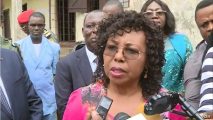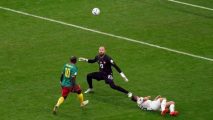Categories
Recent Posts
- Biya regime pledges to repay 616M CFA Francs to Baccalaureate examiners
- France: Marine Le Pen barred from running for public office for five years
- FECAFOOT: Unity prevails amid Eto’o-Brys tensions
- Yaoundé: EYUMEMA welcomes Honorable Rose Abunaw
- CPDM Covid Scandal: Prosecutor seeks 10-Year ban for 4 officials
Archives
- March 2025
- February 2025
- January 2025
- December 2024
- November 2024
- October 2024
- September 2024
- August 2024
- July 2024
- June 2024
- May 2024
- April 2024
- March 2024
- February 2024
- January 2024
- December 2023
- November 2023
- October 2023
- September 2023
- August 2023
- July 2023
- June 2023
- May 2023
- April 2023
- March 2023
- February 2023
- January 2023
- December 2022
- November 2022
- October 2022
- September 2022
- August 2022
- July 2022
- June 2022
- May 2022
- April 2022
- March 2022
- February 2022
- January 2022
- December 2021
- November 2021
- October 2021
- September 2021
- August 2021
- July 2021
- June 2021
- May 2021
- April 2021
- March 2021
- February 2021
- January 2021
- December 2020
- November 2020
- October 2020
- September 2020
- August 2020
- July 2020
- June 2020
- May 2020
- April 2020
- March 2020
- February 2020
- January 2020
- December 2019
- November 2019
- October 2019
- September 2019
- August 2019
- July 2019
- June 2019
- May 2019
- April 2019
- March 2019
- February 2019
- January 2019
- December 2018
- November 2018
- October 2018
- September 2018
- August 2018
- July 2018
- June 2018
- May 2018
- April 2018
- March 2018
- February 2018
- January 2018
- December 2017
- November 2017
- October 2017
- September 2017
- August 2017
- July 2017
- June 2017
- May 2017
- April 2017
- March 2017
- February 2017
- January 2017
- December 2016
- November 2016
- October 2016
- September 2016
- August 2016
- July 2016
- June 2016
Featured
Most Commented Posts
 4 Anglophone detainees killed in Yaounde
4 Anglophone detainees killed in Yaounde
18 comments Chantal Biya says she will return to Cameroon if General Ivo Yenwo, Martin Belinga Eboutou and Ferdinand Ngoh Ngoh are sacked
Chantal Biya says she will return to Cameroon if General Ivo Yenwo, Martin Belinga Eboutou and Ferdinand Ngoh Ngoh are sacked
13 comments The Anglophone Problem – When Facts don’t Lie
The Anglophone Problem – When Facts don’t Lie
12 comments Anglophone Nationalism: Barrister Eyambe says “hidden plans are at work”
Anglophone Nationalism: Barrister Eyambe says “hidden plans are at work”
12 comments Largest wave of arrest by BIR in Bamenda
Largest wave of arrest by BIR in Bamenda
10 comments
Latest Tweets
Featured
-

Biya regime pledges to repay 616M CFA Francs to Baccalaureate examiners
-

France: Marine Le Pen barred from running for public office for five years
-

FECAFOOT: Unity prevails amid Eto’o-Brys tensions
-

Yaoundé: EYUMEMA welcomes Honorable Rose Abunaw
-

CPDM Covid Scandal: Prosecutor seeks 10-Year ban for 4 officials
-

Cameroon still faces power cuts despite full output from Nachtigal Dam
-

Financial scandal rocks Mkpot Oil Mill Project!! Manyu Chiefs won’t talk
© Cameroon Concord News 2025





24, September 2018
Understanding Southern Cameroons vicious war of secession 0
A vicious war of secession has ravaged the two Anglophone regions of Cameroon since January 2018. Non-state militias warring with the government aim to create an independent Ambazonian state. While central Africa has seen its share of wars of secession (the majority of which culminate in an agreement between the parties), aspects of Cameroon’s secessionists distinguish them, and this war, from others.
To refer to the group in public by the wrong name amidst the wrong strangers could invite a beating or even one’s murder. Therefore, in public civilians refer to secessionists as the Amba, or the Amba Boys. Privately, those who support the secessionists refer to them as freedom fighters, restoration forces, or, the army. Those who oppose them refer to them as the boys, the Ambazonians, and the terrorists.
But Anglophone Cameroonians overwhelmingly view secessionists positively. This is so even when they object to their tactics. For instance, secessionists call for Ghost Towns, or city-wide strikes every Monday. They call, too, for boycotting all primary and secondary schools. A secondary school teacher in the Southwest Anglophone capital region of Buea noted, “I don’t agree with preventing children from going to school, but I support the secessionists’ aims. Therefore, I tolerate it.” Others, like this 35-year-old entrepreneur in Buea, say, “I completely support all actions the freedom fighters take, and I am honored to keep my daughter from school. Students are just pawns of the Cameroonian president.” When asked whether targeting children and teachers was legitimate he added, “Yes, they are supporting the Biya regime.”
This perspective is not limited to the Anglophone regions. Anglophones in Francophone Cameroon like this cab driver in the country’s largest city, Douala, say, “Francophone Cameroonians do not understand the Anglophones’ plight. They assume everything the freedom fighters do is bad. They never listen to us, and cannot be trusted, so, independence is our only option.”
During the first few months of the conflict, the secessionists generally targeted only those who disobeyed their orders, or who they suspected had government affiliations. This has changed drastically in recent months. In villages and cities spanning both Anglophone regions, the secessionists extort, kidnap, and rape civilians. Public opinion seems increasingly impervious to such offenses. The secessionists lack a central command, and so when rape or extortion occurs people are quick to pin it on imposters, not the real secessionists.
Such deflections are not entirely without merit. There are more than 20 secessionist groups fighting in the two Anglophone regions at the time of this writing in September of 2018. The majority of these arose during the summer, correlating directly with the violence spike against civilians. Additionally, the so-called interim Ambazonian government has condemned all attacks and denied all responsibility. Such refutations are near impossible to verify given the informal secessionist structure which often as not is controlled from outside Cameroon.
Interestingly, purported, legitimate secessionists have punished others for abusing civilians. In August, secessionist leaders in Buea apprehended, publicly beat, and disposed of four people. The four were extorting locals supposedly on behalf of the secessionists. At the same time, however, individuals claiming separatist affiliations continue extorting civilians without punishment.
Which brings us to this tale’s central oddity: Anglophone Cameroonians attribute magical powers, or juju, to those who they believe to be legitimate secessionist fighters. They believe secessionist fighters adhere to strict codes of conduct that abhor rape, murder, and extortion. They believe in return for abiding by these rules the secessionists can shapeshift and are impervious to bullets and knives. The Cameroonian military has repeatedly turned its weapons over to secessionist fighters without a fight. Secessionist fighter deaths fail to dispel the illusion. They are proof that the fighters broke the conduct code or were illegitimate secessionists in the first place. As Cameroon’s crisis worsens, understanding the socio-cultural underpinnings of the conflict remains critical.
Source: Modern Ghana